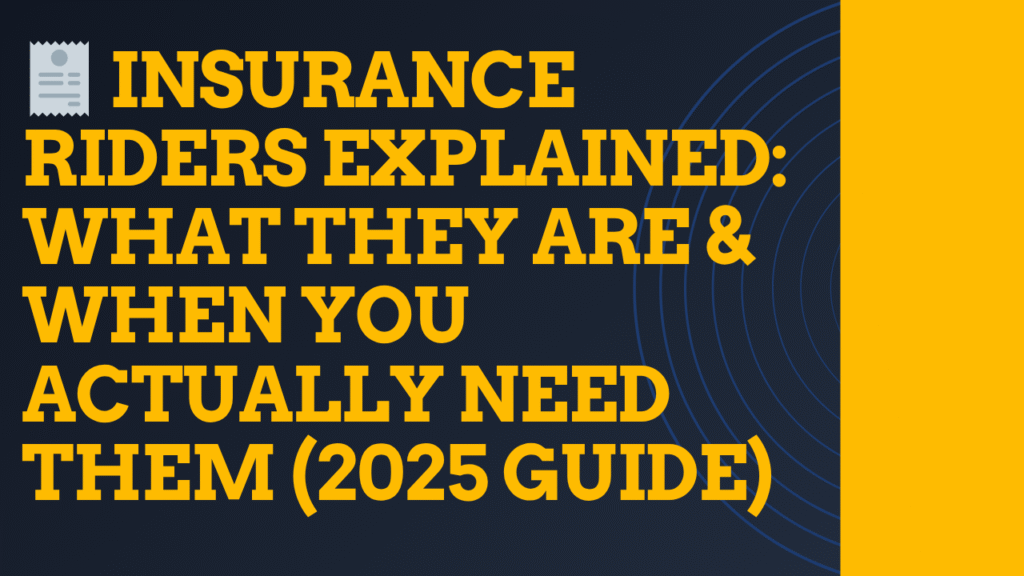🧾 Insurance Riders Explained: What They Are & When You Actually Need Them (2025 Guide)
When it comes to insurance, most people stick with the base policy. But did you know you can customize your coverage with low-cost add-ons called riders?
Insurance riders give you extra protection, flexibility, and value—often for just a few extra dollars a month.
In this 2025 guide, we’ll cover everything you need to know about insurance riders: what they are, which ones are useful, and how to know if they’re worth adding to your policy.

📌 Table of Contents
- What Is an Insurance Rider?
- How Insurance Riders Work
- Common Types of Riders (Life, Health, Auto, Business)
- When Should You Get a Rider?
- Pros and Cons of Riders
- Tips for Choosing the Right Rider
- Final Thoughts + CTA
💡 What Is an Insurance Rider?
An insurance rider (also called an endorsement or add-on) is a provision you can add to an existing policy to extend or customize your coverage.
It allows you to:
- Add benefits not included in the base policy
- Cover specific risks unique to your lifestyle
- Protect people or property beyond standard terms
🧠 Think of it as upgrading your insurance without replacing the whole policy.
🔁 How Insurance Riders Work
You typically pay a small extra premium for each rider you add. This premium is added to your base policy cost.
Example:
You buy a $500,000 term life policy. For an extra $5/month, you add a critical illness rider. If you’re diagnosed with cancer or have a stroke, you get a lump-sum payout even if you’re still alive.
Riders are often locked in at the time you buy your policy, so it’s important to understand your options upfront.
🧩 Common Types of Insurance Riders
🧬 Life Insurance Riders
| Rider Type | What It Does |
|---|---|
| Accidental Death | Pays extra if death is due to an accident |
| Waiver of Premium | Waives future premiums if you become disabled |
| Critical Illness | Pays out on diagnosis of cancer, stroke, or heart attack |
| Accelerated Death Benefit | Lets you access a portion of death benefit early (terminal illness) |
| Child Term Rider | Covers your children under your life policy |
| Return of Premium | Refunds your premiums if you outlive the policy term |
🏥 Health Insurance Riders
| Rider Type | What It Covers |
|---|---|
| Maternity Rider | Pregnancy and childbirth expenses (often not included in base plan) |
| Hospital Cash Rider | Pays daily amount during hospitalization |
| OPD Rider | Covers outpatient doctor visits and diagnostics |
| Critical Illness Rider | Payout on diagnosis of serious diseases |
🚗 Auto Insurance Riders
| Rider Type | What It Does |
|---|---|
| Zero Depreciation | Covers full cost of parts without depreciation cuts |
| Roadside Assistance | Covers towing, jump-starts, flat tires, etc. |
| Engine Protection | Covers non-accident-related engine damage (e.g., water, leakage) |
| Passenger Cover | Covers injury to passengers in your car |
🧑💼 Business Insurance Riders
| Rider Type | Use Case |
|---|---|
| Cyber Liability Rider | Protects from data breaches and hacking costs |
| Equipment Breakdown | Covers repairs to critical business machinery |
| Loss of Income Rider | Provides income if business is interrupted due to covered peril |
💼 Riders make your insurance more tailored, effective, and responsive.

🎯 When Should You Get a Rider?
You should consider a rider when:
- You want specific coverage not included in your base policy
- You have unique risks or health issues
- You want to protect family members or business assets
- You want a more complete policy without buying a new one
For Example:
- Parents often add child term riders
- Solo travelers might opt for accidental death or medical riders
- Business owners benefit from equipment or cyber risk coverage
✅ Riders let you fine-tune your protection without overspending.
⚖️ Pros and Cons of Riders
✅ Pros:
- Low cost for high-value benefits
- Highly customizable
- Extends coverage without needing new policies
- Helps fill gaps in basic plans
❌ Cons:
- Must be added at the time of purchase (in most cases)
- May duplicate coverage you already have
- Not always available with every insurer or policy
- Some have strict claim conditions or waiting periods
🔍 Read the fine print and understand eligibility and claim rules before adding.
🧠 Tips for Choosing the Right Rider
- Assess your lifestyle risks – travel, illness history, dependents
- Check what your base policy already covers
- Avoid overlapping coverage
- Don’t buy unnecessary riders just because they’re cheap
- Talk to an insurance advisor for personalized recommendations
- Review your riders annually as your life and business evolve
📌 Only add riders that truly match your real-world needs.
🚀 Final Thoughts
Insurance riders may sound small—but they can offer huge peace of mind. Whether you’re protecting a growing family, a startup, or yourself, adding the right riders can fill critical gaps in your coverage.
They’re one of the most cost-effective ways to customize your protection without overspending.
👉 Ready to Upgrade Your Coverage?
Ask your insurer what riders are available with your existing policy—or explore new policies with built-in options. A few extra dollars today could save you thousands tomorrow.
Personalized coverage = smarter protection.